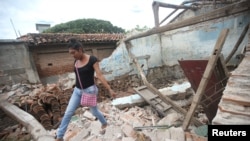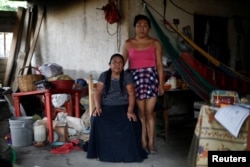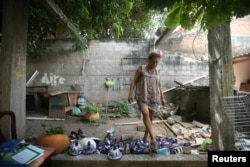Destruction wrought by Mexico's massive earthquake has put a spotlight on the quasi-matriarchal indigenous traditions of the worst affected town, with women and third-gender “muxes” playing a leading role in the aftermath of the disaster.
Located in Mexico's narrow isthmus region, about 400 miles (644 km) southeast of capital Mexico City, Juchitan bore the brunt of the 8.1 magnitude earthquake that flattened thousands of buildings in the humid market town in a matter of seconds and took at least 96 lives nationwide.
In vivid contrast to Mexico’s macho, male-dominated society, travelers have noted since at least the 1800s the relative equality of Juchitan's mainly Zapotec men and women, as well as the prominence of muxes, Zapotecs born biologically male who mix gay and feminine identity.
After the earth shook violently just before midnight on Thursday, women, muxes and men all leapt into action, in many cases pulling away rubble with their bare hands.
“I carried my mother out as I left the house, and then my brother and I went to rescue my aunt who was trapped,” Peregrina Vera, a tall, 26-year-old muxe, said in a sing-song voice, her long hair tied in a bun.
She then helped pull up rubble to free her grandmother after hearing shouts for help, Vera said, sitting in an outdoor patio just beyond the collapsed walls of her house, where two aggressive pet ducks snapped brightly colored bills at visitors.
Locals say there is a muxe in every Juchitan family. They are widely accepted despite an ingrained Roman Catholic heritage and known for dedication to family, especially for taking care of mothers as other siblings move out.
Market power
Among the severely damaged buildings was the downtown market, the most important for miles around and the heart of Zapotec women's economic power for more than a century. Slated for demolition due to the quake damage, its loss is a blow to Juchitan's women.
Irma Lopez, 44, who sold traditional indigenous clothing, was proud that 80 percent of market vendors were women but said it meant they were particularly hard hit by the destruction.
“We are the ones who have lost the most,” Lopez said, standing just outside the market as a light rain fell. She was waiting for relatives to help remove her last boxes of merchandise, as trucks pulled up to haul away her and other women's goods.
In an 1859 account, French traveler and historian Brasseur de Bourbourg appreciatively described the sprawling marketplace as run by strong, unrestrained women who “openly made fun of their men ... with a shamelessness hardly equaled.”
Roughly eight in 10 residents of Juchitan are indigenous, mostly Zapotec. Women are typically also in charge of family finances, said Felina Santiago, a muxe and beauty shop owner, speaking outside her badly damaged home.
“Many say Juchitan is the ultimate matriarchy. It's a city of women who fight, who work hard,” Santiago said.
“Now more than ever, we're going to work to get back on our feet,” she said, just as a structure on her block loudly collapsed, causing a sudden stir as neighbors rushed to the spot.
No one was hurt.
Men wash dishes
In Juchitan's Seventh Division residential neighborhood, Margarita Lopez, a 56-year-old domestic worker, craned her head as she stood in a crowd of women waiting for a promised delivery of government aid, which turned out to be mostly canned food.
“Yes, we have our husbands, and we don't leave them behind. But we women matter more. We take decisions, more than the men do,” she said, as others nearby nodded in agreement.
Lopez spoke of how it is common in the city of about 100,000 people for husbands to help with household chores like cooking and washing dishes, in a country where such tasks are traditionally seen as the preserve of women.
Men find the division of labor in the area “natural,” said male Juchitan surgeon Ovidio Pineda. Women and men “share the decisions, share the responsibilities,” he added.
Marta Toledo, whose bar housed in a 200-year-old building collapsed in the quake, killing three clients, said the disaster would not crush Juchitan's spirit, as another aftershock sent her and others running to safety.
“Women stand out here, in terms of work and intelligence and experience,” she said, wearing a traditional huipil top and standing near the pile of rubble that was once the bar.
“We have to rebuild and rise like the phoenix," she said, breaking out into a song in the Zapotec language with the chorus “I want to shout, I am alive!”







